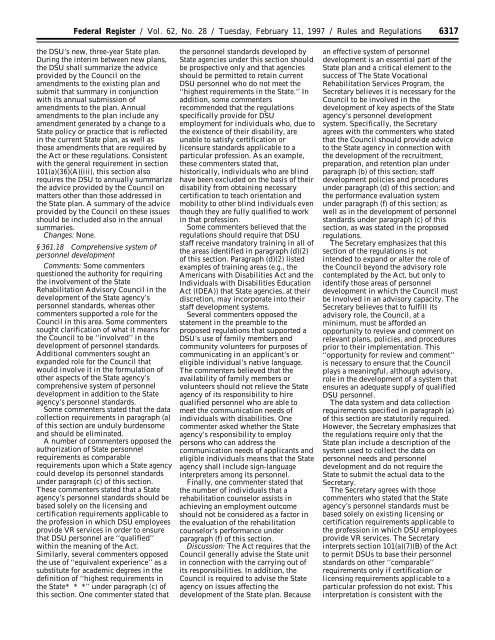federal register - U.S. Government Printing Office
federal register - U.S. Government Printing Office
federal register - U.S. Government Printing Office
Create successful ePaper yourself
Turn your PDF publications into a flip-book with our unique Google optimized e-Paper software.
Federal Register / Vol. 62, No. 28 / Tuesday, February 11, 1997 / Rules and Regulations6317the DSU’s new, three-year State plan.During the interim between new plans,the DSU shall summarize the adviceprovided by the Council on theamendments to the existing plan andsubmit that summary in conjunctionwith its annual submission ofamendments to the plan. Annualamendments to the plan include anyamendment generated by a change to aState policy or practice that is reflectedin the current State plan, as well asthose amendments that are required bythe Act or these regulations. Consistentwith the general requirement in section101(a)(36)(A)(iii), this section alsorequires the DSU to annually summarizethe advice provided by the Council onmatters other than those addressed inthe State plan. A summary of the adviceprovided by the Council on these issuesshould be included also in the annualsummaries.Changes: None.§ 361.18 Comprehensive system ofpersonnel developmentComments: Some commentersquestioned the authority for requiringthe involvement of the StateRehabilitation Advisory Council in thedevelopment of the State agency’spersonnel standards, whereas othercommenters supported a role for theCouncil in this area. Some commenterssought clarification of what it means forthe Council to be ‘‘involved’’ in thedevelopment of personnel standards.Additional commenters sought anexpanded role for the Council thatwould involve it in the formulation ofother aspects of the State agency’scomprehensive system of personneldevelopment in addition to the Stateagency’s personnel standards.Some commenters stated that the datacollection requirements in paragraph (a)of this section are unduly burdensomeand should be eliminated.A number of commenters opposed theauthorization of State personnelrequirements as comparablerequirements upon which a State agencycould develop its personnel standardsunder paragraph (c) of this section.These commenters stated that a Stateagency’s personnel standards should bebased solely on the licensing andcertification requirements applicable tothe profession in which DSU employeesprovide VR services in order to ensurethat DSU personnel are ‘‘qualified’’within the meaning of the Act.Similarly, several commenters opposedthe use of ‘‘equivalent experience’’ as asubstitute for academic degrees in thedefinition of ‘‘highest requirements inthe State* * *’’ under paragraph (c) ofthis section. One commenter stated thatthe personnel standards developed byState agencies under this section shouldbe prospective only and that agenciesshould be permitted to retain currentDSU personnel who do not meet the‘‘highest requirements in the State.’’ Inaddition, some commentersrecommended that the regulationsspecifically provide for DSUemployment for individuals who, due tothe existence of their disability, areunable to satisfy certification orlicensure standards applicable to aparticular profession. As an example,these commenters stated that,historically, individuals who are blindhave been excluded on the basis of theirdisability from obtaining necessarycertification to teach orientation andmobility to other blind individuals eventhough they are fully qualified to workin that profession.Some commenters believed that theregulations should require that DSUstaff receive mandatory training in all ofthe areas identified in paragraph (d)(2)of this section. Paragraph (d)(2) listedexamples of training areas (e.g., theAmericans with Disabilities Act and theIndividuals with Disabilities EducationAct (IDEA)) that State agencies, at theirdiscretion, may incorporate into theirstaff development systems.Several commenters opposed thestatement in the preamble to theproposed regulations that supported aDSU’s use of family members andcommunity volunteers for purposes ofcommunicating in an applicant’s oreligible individual’s native language.The commenters believed that theavailability of family members orvolunteers should not relieve the Stateagency of its responsibility to hirequalified personnel who are able tomeet the communication needs ofindividuals with disabilities. Onecommenter asked whether the Stateagency’s responsibility to employpersons who can address thecommunication needs of applicants andeligible individuals means that the Stateagency shall include sign-languageinterpreters among its personnel.Finally, one commenter stated thatthe number of individuals that arehabilitation counselor assists inachieving an employment outcomeshould not be considered as a factor inthe evaluation of the rehabilitationcounselor’s performance underparagraph (f) of this section.Discussion: The Act requires that theCouncil generally advise the State unitin connection with the carrying out ofits responsibilities. In addition, theCouncil is required to advise the Stateagency on issues affecting thedevelopment of the State plan. Becausean effective system of personneldevelopment is an essential part of theState plan and a critical element to thesuccess of The State VocationalRehabilitation Services Program, theSecretary believes it is necessary for theCouncil to be involved in thedevelopment of key aspects of the Stateagency’s personnel developmentsystem. Specifically, the Secretaryagrees with the commenters who statedthat the Council should provide adviceto the State agency in connection withthe development of the recruitment,preparation, and retention plan underparagraph (b) of this section; staffdevelopment policies and proceduresunder paragraph (d) of this section; andthe performance evaluation systemunder paragraph (f) of this section; aswell as in the development of personnelstandards under paragraph (c) of thissection, as was stated in the proposedregulations.The Secretary emphasizes that thissection of the regulations is notintended to expand or alter the role ofthe Council beyond the advisory rolecontemplated by the Act, but only toidentify those areas of personneldevelopment in which the Council mustbe involved in an advisory capacity. TheSecretary believes that to fulfill itsadvisory role, the Council, at aminimum, must be afforded anopportunity to review and comment onrelevant plans, policies, and proceduresprior to their implementation. This‘‘opportunity for review and comment’’is necessary to ensure that the Councilplays a meaningful, although advisory,role in the development of a system thatensures an adequate supply of qualifiedDSU personnel.The data system and data collectionrequirements specified in paragraph (a)of this section are statutorily required.However, the Secretary emphasizes thatthe regulations require only that theState plan include a description of thesystem used to collect the data onpersonnel needs and personneldevelopment and do not require theState to submit the actual data to theSecretary.The Secretary agrees with thosecommenters who stated that the Stateagency’s personnel standards must bebased solely on existing licensing orcertification requirements applicable tothe profession in which DSU employeesprovide VR services. The Secretaryinterprets section 101(a)(7)(B) of the Actto permit DSUs to base their personnelstandards on other ‘‘comparable’’requirements only if certification orlicensing requirements applicable to aparticular profession do not exist. Thisinterpretation is consistent with the


